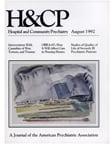Effectiveness of a Stress Recovery Unit During the Persian Gulf War
Abstract
The unit was the first level of treatment for most subjects. It was located close to their units, enabling visits by unit members. Considering the large amount of symptomatology on admission, the average length of stay (four days) was relatively short, and all but one subject were able to return to their units. The decline in anxiety, depression, and hostility as well as dysphoria from admission to discharge was impressive.
Both individually and in group sessions, subjects described many apparent stressors, some of which were unique to the experience of being in a combat zone. They included fear of being attacked, not knowing the length of stay in Saudi Arabia, long duty hours with little rest, lack of privacy, infrequent showers, and feelings of having no control over their lives. Almost half of the subjects believed that the leadership in their units was dysfunctional. Some were also concerned with problems at home. Subjects were encouraged to ventilate their anger, fears, and concerns during the group therapy sessions. They showed a great deal of interest, participation, and interaction during those sessions and during the educational sessions.
We feel that this group of soldiers benefited from the program of the stress recovery unit. Only one returned for outpatient counseling. Due to the short duration of the war, we were unable to follow up on the other subjects after they returned to their units. Ideally, controlled multisite studies should be planned and ready for implementation to help us learn better ways to maximize treatment outcomes with minimal personnel situation.
Access content
To read the fulltext, please use one of the options below to sign in or purchase access.- Personal login
- Institutional Login
- Sign in via OpenAthens
- Register for access
-
Please login/register if you wish to pair your device and check access availability.
Not a subscriber?
PsychiatryOnline subscription options offer access to the DSM-5 library, books, journals, CME, and patient resources. This all-in-one virtual library provides psychiatrists and mental health professionals with key resources for diagnosis, treatment, research, and professional development.
Need more help? PsychiatryOnline Customer Service may be reached by emailing [email protected] or by calling 800-368-5777 (in the U.S.) or 703-907-7322 (outside the U.S.).



